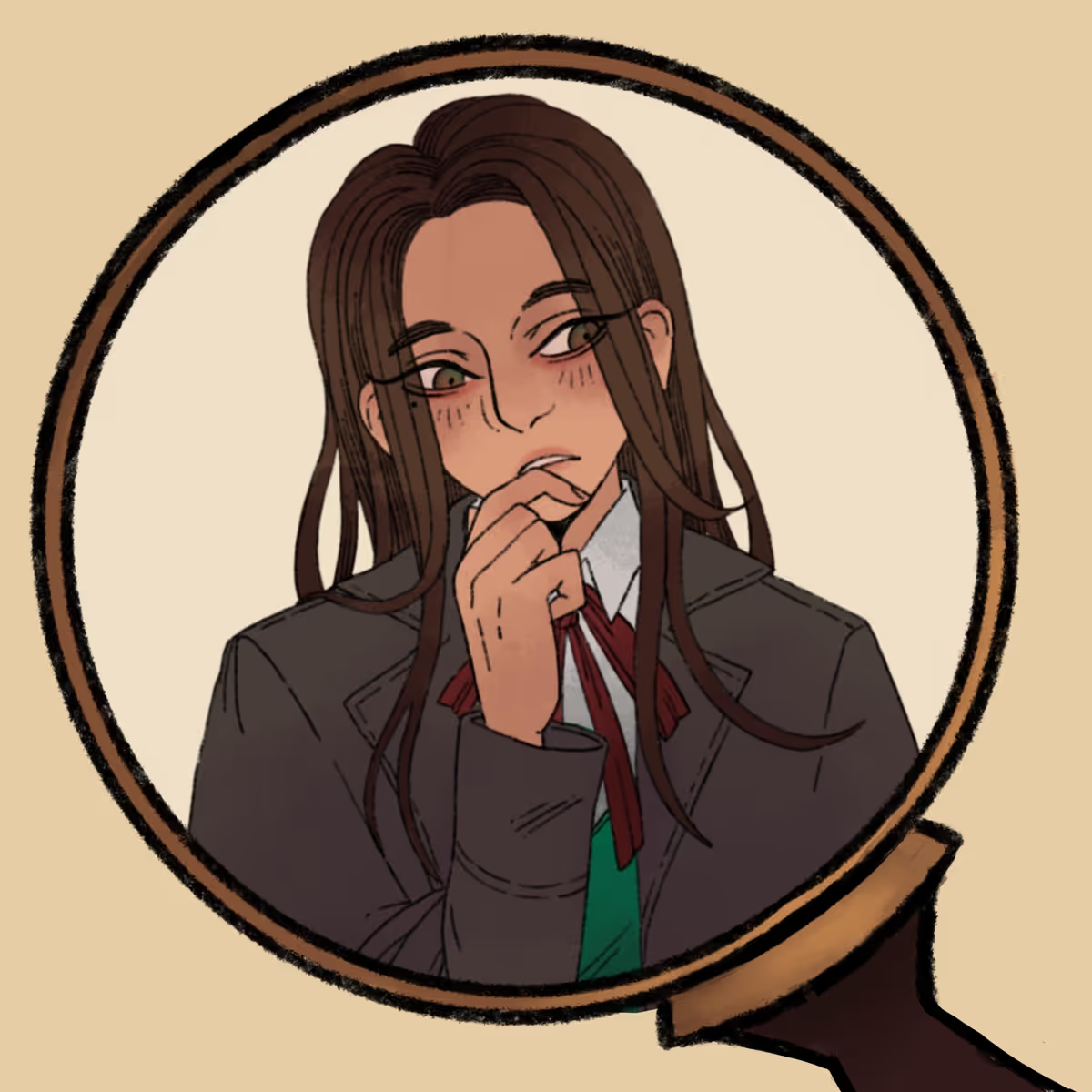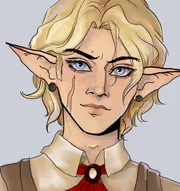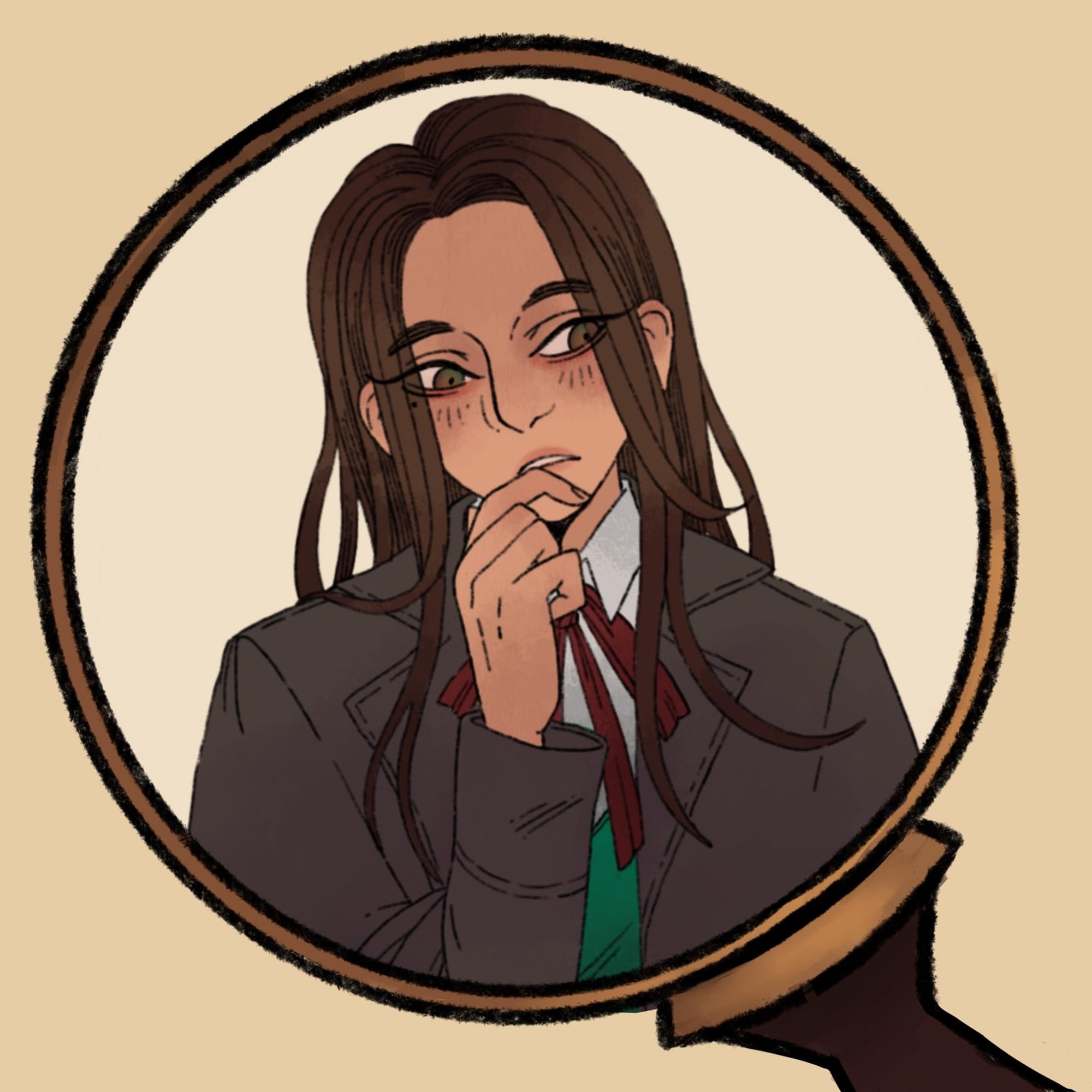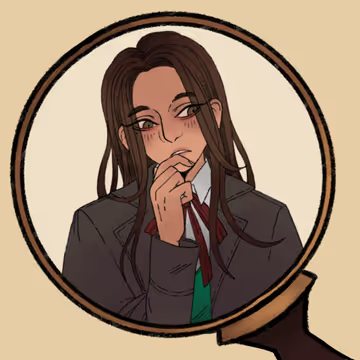The Vanishing Beast: Chapter Five
Visiting the other Tamarley.

The Case Files of Sheridan Bell #1
Welcome to The Case Files of Sheridan Bell, a fantasy-mystery webseries about an up-and-coming private detective in the city of Tamarley.
Crouching to examine the pawprints, Henry pulled his ruler out with a triumphant laugh and measured their width. He shut it again with a snap. “It’s definitely canine—I’d suspected as much by the lacerations, but these are more the prints of a common dog than any sort of wild beast or feline. Based on the radius of the bite and the size, I’d estimate the creature is…well, at least three feet tall. Perhaps not a common dog, then.”
Alice stared at him, aghast, but he paid her no mind, instead turning and waving his arms in the direction of the gravel drive leading up to Camberley Hall. When he caught the attention of one of the constables there, he pointed exaggeratedly down at the road and made a beckoning gesture. Then, without waiting for their arrival, he walked off. “There. Now Inspector Zhou can’t say I never give him anything.”
Alice hurried to catch up. “What was all that? Is the dog that left those tracks also the beast that killed Hathaway? Who does it belong to? Does this mean you can get Saoirse out of jail?” she asked. The two continued on foot through gaudy streets and past gated estates into more familiar—if somewhat drabber—neighborhoods.
“Not quite yet,” Henry said, answering the last question first. He tugged his watch out of his waistcoat pocket and checked the time; it was already nearly noon. “Inspector Zhou will need more evidence than a pawprint before he’s willing to let your sister go. I have theories, but I need more answers before I’m comfortable voicing any of them. Are you hungry at all?” he asked Alice, keeping a sharp eye on the city around them as they walked.
“I guess I could eat,” Alice said. While she spoke, Henry glanced down at a dislodged cobblestone, hesitated, then made a sharp turn seemingly at random. At first, Alice didn’t notice, and she had to backtrack to catch up.
“Do you miss sídhe cuisine? I know of a place nearby that’s delightful,” Henry said. As he led them deeper into the city, his gaze continued to fall on subtle, passing oddities: a bloom sprouting through a crack in the pavement, pointing south, a linen sheet hanging on a clothesline above their heads, snapping and fluttering despite the stillness of the day, a sign hanging above an inn, the golden lettering backward as if reflected in a mirror.
Alice noticed none of these things, nor did she seem to notice Henry’s strange behavior. “A sídhe restaurant?” she asked, instead. “Here? How come I’ve never heard of it?”
“Not here, exactly,” Henry said, “But close enough. We’ll have to cross to the other Tamarley.”
Alice stopped suddenly, eyeing Henry as if he’d sprouted a second head. “We can’t do that.”
“Why not?” Henry asked.
Alice scowled. “I don’t have a passport, so Customs won’t let me through. And even if they would, we’re going the wrong way. All the fixed points are down by the river.”
“All of the fixed points are, yes,” Henry agreed, looking around them before settling on another side street and starting down it. “I don’t need a fixed point, and you don’t need a passport.”
“What do you mean, you don’t need a fixed point? That’s the only way to cross over.”
“Not necessarily true,” Henry said. Even without looking at her to confirm, he could feel Alice’s gaze on him, wary and disbelieving. “People do it by accident, sometimes.”
Alice scoffed. “I know that! It happened to me. But you can’t cross over without a fixed point on purpose.” Despite her protests, she still followed Henry when he turned down a dark alley, so caught up in arguing that she didn’t notice where they were until she was halfway through. Then, she stopped, leveling another one of her suspicious glares at Henry. “What are we doing here?”
Henry nodded toward the other end of the alley, where sunlight pierced the gloom and beckoned them onward. “Trust me. It’s just down this way.”
He continued without her, slowly, giving her space to decide whether she wanted to follow. After a moment, she did, only to stop again once they emerged out the other side. It was like they had entered a different city entirely. Around them, the streets had transformed from gloomy and dull to peaceful and bright. Above them, fluffy white clouds drifted across a crystalline sky. There was no industrial smog, no horns blaring or carriages rattling, no thrumming crowds. Though the buildings around them took the same forms, filled the same shapes, everything else had changed.
Alice gawked at it all, tipped her head back to stare up at the wide, open sky. “Is this really…?”
Henry smiled at her awed expression and nodded.
“How did you do that? You’ll be able to get us back, right?” she asked.
“Of course. I’ve been doing this since I was a teenager,” Henry said. “Come along, now, Alice.”
Alice followed Henry in a daze, her wide eyes taking in everything around them. They no longer passed busy and bustling humans in neutral-toned, sharply-tailored clothing, but sídhe, graceful and cold, dressed in strange styles and soft fabrics that only existed on this side of the city. Some of the sídhe gave Alice and Henry curious looks as they passed, but others decorated storefronts and public squares with wreaths and bright garlands, too busy preparing for the festivals that would take place that weekend to notice the trespassers.
Before Alice could recover enough to ask any questions, they arrived at a small bistro with a patio for outdoor seating. The server, a young sídhe woman with a bright dress and flowers in her hair, led them to one of these sun-soaked tables, which allowed Alice to gape even more at the streets and buildings and festival preparations.
Henry watched her with amusement. “When’s the last time you were here?”
Alice met his gaze and quickly looked away, running her fingers along the cold metal edge of the table. It was, notably, not iron. “It’s been three years. When my grandmother died, I, um…ran away from home and accidentally passed between. I was trying to get as far from my parents as possible, so I was actually glad when I ended up in the human city. I wasn’t there long before Saoirse found me.”
“I’ve been wondering about that,” Henry said, sitting back in his seat and avoiding the questioning look Alice shot him. “You’re not related, so what exactly is your relationship with Saoirse?”
Alice blinked. “She’s like a sister. She took me in.”
“But you work for her?”
Alice shrugged. “That’s only how it started. I was living on the streets when she found me, but I wasn’t about to take free help from anyone. She let me rent her spare room in exchange for working for her. Then after a while, she got me into school and signed on to be my guardian through a changeling agency.”
“But she still makes you help with the shop services?”
“No,” Alice said defensively. “She doesn’t make me. She’s said I can quit, but I want to do my part. And she never asked me to help her with the services, either. Those were my idea.”
Henry held his hands up between them, placating. “I just wanted to be sure she isn’t taking advantage of you.”
“She’s not, and even if she was, working in her shop would be better than being shipped off to some changeling orphanage or living on the streets. What do you even care about a runaway changeling for, anyway? No one else does.”
“I care,” Henry said, simply.
Alice eyed him a moment, then opened her mouth to say something, but she was interrupted by the server arriving to take their orders. Only once the server had gone again did she ask, “So how do you get between cities like that? How are you so sure you’ll be able to get us back? If there’s a fixed point in that alley, how come nobody else has found it?”
Henry smiled to himself, having expected the questions. He gestured at the city around them, clean and verdant and vibrant. “Most people think of this Tamarley and the other as being separate cities existing in separate places,” he said. He then held out both of his hands, palms up, moving them like a weighing scale. “Both Tamarleys are places you travel to or between, whether it be for work or pleasure, same as you might travel to another country. There are certain spots—along the river, like you said—that you must pass through to start the journey. The fixed points. Yes?”
Alice nodded. “Yes.”
“No,” Henry corrected. “I don’t believe this way of looking at it is correct. I believe Tamarley is only one city, existing in one place at one time.” He hid one hand under the table and flipped the remaining one over. “Like two sides of a quilt. You don’t travel to either city because, in a way, you’re already in both. The fixed points mark the places where the two worlds are closely, permanently stitched together, but they brush against each other in other places, too. While there are fixed points, there are also transitory ones. They’re quite difficult to find and they’re always changing, but in a city this large, stumbling into them is a simple question of probability. That’s why almost anyone you meet knows someone who’s passed between cities accidentally, even if it’s just a friend of a friend of a relative. You, Ms. Evans, are one of few such unlucky souls.”
Henry held up a finger. “If you know how to look for these transitory points, you can weave between the cities intentionally. It always starts with small signs, so subtle you won’t notice them if you’re not watching closely. A patch of street more humid than the ones surrounding. An animal not behaving quite as it should. A sound or smell that doesn’t belong. From there, you follow the clues like a map. The closer you get, the more obvious the strangeness becomes. Shadows point the wrong way, disembodied voices converse in the streets, rain falls on a cloudless day.”
Alice watched him with wide eyes. “How did you figure this out? Did someone teach you?”
Henry’s smile, which had grown as he explained his theories, fell. “No, I had to learn for myself.”
“Had to?” Alice asked, sitting forward excitedly. “Does that mean…did you pass through on accident? Are you a changeling, too?”
“Not me, no. I had a friend…a sídhe boy named Taise.”
Alice waited, clearly expecting him to continue, so he did. “You know, it’s funny. Humans would have you believe there are sídhe who’d give anything to get their hands on a human child, that they’ll take your babies in the night if you aren’t careful, but the exact opposite happened to Taise. He was taken from his home by humans and abandoned in the human city, or so he said. I just came home one day and found him crying on the steps, so of course, I took him in and promised to get him home. I was just a child myself; I didn’t realize how difficult that promise would be to fulfill.
“As I’m sure you know, Customs won’t let anyone between the cities without either a passport or proof that someone is looking for them on the other side, which Taise didn’t have. He stayed with us for a few weeks, until I overheard my parents discussing taking him to one of the orphanages—we were never a wealthy household, and the extra mouth was putting more strain on them than I had realized. So the next day, I marched Taise down to the Customs borders myself. They turned us away, of course,” Henry continued with a wry smile, “But not before I noticed all the strange things around the fixed points. As we made our way back home, I noticed more of those same kinds of distortions and decided to follow where they led. We followed them all the way to the sídhe city, and that was the first time I ever wove between Tamarleys.”
“What happened to your friend?” Alice asked.
Henry shrugged. “I escorted him back to his family estate and that was it. I managed to return home to where my parents were waiting, worried out of their minds. Eventually, I did try to visit Taise in the sídhe city, but it took me a while to find my way back, since I didn’t have the trained eye I do now. By the time I succeeded, I found his estate burned to the ground. I never found out what happened, and I never saw Taise again.”
Alice’s eyes widened. “Oh.”
Henry sighed and rested his chin in his hands. “When I think back on it now, something wasn’t right about the situation to begin with. Taise clearly came from a wealthy family—were they not looking for him in the time he stayed with us? His house had strict security, even in the glimpse I saw of it; how did the kidnappers smuggle him out? Why go to that trouble only to abandon him? Was there no ransom? Was the house burning related?” Henry shook his head. “My apologies. I didn’t mean to burden you with this. It was just…well, my first case, in a way, and I never managed to solve it.”
“Maybe Taise died in the fire,” Alice suggested.
Henry frowned. “Thank you, Alice.”
Alice shrugged.
Finally, their food arrived, plates of green vegetables, flaky pastries, and bright fruits set down in front of them. The food on this side of the city was nicer than you could usually find in Brimnes, which in recent decades had sacrificed quality for convenience. They ate in silence, Alice enthusiastically digging in while Henry puzzled over Taise and the curious case of the beast that vanished into thin air. When their plates were cleared and the bill came, Alice turned wide eyes on Henry. “I forgot. Saoirse usually—”
Henry waved her off, already pulling out his pocketbook. “I’ll add it to your sister’s bill,” he said with a quirk of a smile. He paid quickly, and the two of them continued on their way.
“Are we going to cross back into the other city?” Alice asked while they walked, unable to hide her excitement at the prospect.
Henry shoved his hands in his pockets and looked up at the clear sky. “Eventually, when I see a place to weave back. For now, we can take the scenic route. The human streets will be busy at this hour, anyway.”
“Where are we going?” Alice asked.
“I have one more stop I need to make today.”
“For saving Saoirse?” Alice asked.
“Yes, for saving Saoirse,” Henry said. He stopped walking, waiting until Alice stopped as well, and smiled warmly at her. “Ms. Evans, I believe with all my heart that your sister is innocent. I promise I won’t rest until she’s free.”
Alice nodded, eyes wide, then sniffed and looked away. “You’re making big promises you might not be able to keep, again, but…thank you.”
If you’d like to support the story, the best thing you can do is share it with others. You can also support the author with a one-time tip, or get perks in one of two membership tiers:
$2/month - Receive a behind-the-scenes newsletter that includes character art, exclusive content and updates, writing advice, and more.
$5/month - In addition to the above newsletter, receive chapters one week early.



Discussion